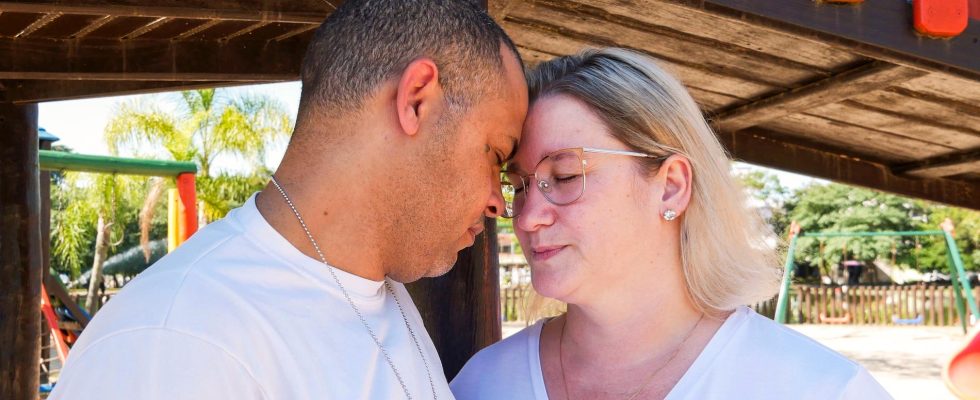Published: Just now
1 of 5 Photo: Emma Garzon/TT
A parent’s worst nightmare came true for Neide Cunha and Bruno Amaral. They lost their five-year-old son in an ax attack at a Brazilian school.
In Brazil, school attacks used to be rare, but since last year they have increased dramatically. The pandemic is one of the reasons, according to researchers.
A sea of flowers and a lone teddy bear lie outside the colorful school building in Blumenau in southern Brazil. Children usually play and learn here, but not now. A few weeks ago, the unimaginable happened: A 25-year-old man entered the school’s playground and attacked several children with an axe. After the crime, the perpetrator turned himself in to the police.
Police told
Bernardo Cunha Machado was the only child of Neide Cunha and Bruno Amaral. Usually he wasn’t in the best morning mood. But that day he woke up happy and played rabbit with his dad and best friend before they went to school.
A few hours later, Neide Cunha received a message from the school principal that her son had been injured. When she arrived at school, she saw other students hugging their parents, but her son did not appear. In the end it was the police who told us that Bernardo was dead.
When Bruno Amaral arrived at the scene, he was met with heartbreaking sadness.
– My first thought was to give security to my wife, she was my priority, he says.
Neides Cunha’s eyes tear up when she talks about the nightmarish day – something she still wants to do to honor her child’s memory.
– I wish I had my son in my arms, that he could come back, she says.
The insulation helped
Bernardo Cunha Machado and Neide Cunha are unfortunately not alone. Since 2002, 22 planned violent attacks on schools have taken place in Brazil. A total of 35 people have died, according to a survey made by Telma Vinha, doctor of education and professor at Unicamp University.
The study shows that school violence has historically been relatively uncommon in Brazil. But between August last year and until the end of March, a total of nine attacks took place. Vinha points out the social isolation of the covid pandemic as one of the reasons for the increase. During the pandemic, some Brazilian schools were closed for up to two years.
– The intense coexistence between family members in a context of fear and uncertainty as well as the growing social vulnerability contributed to the increase in negative psychological effects and mental disorders, says Telma Vinha.
She adds that during the lockdown, young people spent a lot of time on games and social networks. In some of them there was a link to hate speech.
Want to prevent violence
Common factors for those who carried out school attacks in Brazil are a negative image of the school combined with racist, sexist or Nazi ideals. Telma Vinha believes that it is necessary to discuss issues such as hate speech and radicalization in school.
– School can be a violent place. But it can also be a privileged place where you can prevent conflicts and aggression and promote well-being and democratic coexistence, she says.
The Brazilian government is on the same line. Recently, an investment of the equivalent of SEK 6.3 billion was presented to prevent violence in schools. The money will, among other things, go towards safety equipment, training of school staff and support centers for mental illness. At the same time, monitoring and investigation must be intensified of profiles on digital platforms that encourage violence and crime.
Saw peers
Telma Vinha’s mapping of the school attacks was done just before the crime in Blumenau where four children died and several were injured.
Seven-year-old Eduardo Bredun escaped unharmed but saw several comrades die. His mother Veti Bredun says that the incident left a deep mark on her son. Now he’s scared, he doesn’t want to eat or go back to his old school. While waiting for a new school, Veti Bredun tries to make the most of every minute with her boy.
– There is so much suffering. It feels difficult to know that I can put my son to bed at night, but the parents who lost their children will never get that chance again, she says.
“Missing his love”
Neide Cunha and Bruno Amaral walk through the park that the son used to call “my big world”. When they get to the playground, the other children wave happily.
The couple have been offered support to process the grief, but at the moment they turn to each other. Bruno Amaral says he finds comfort in his wife and in his Christian faith. There is a lot of love in the grieving process, the couple often laugh when they tell each other about their son. Bernardo Cunha Machado liked English and math and he dreamed of becoming a firefighter.
– Bernardo was happy, intelligent and loving. What I miss most about him is his love, says Neide Cunha.
FACTS
Brazil
The world’s fifth largest country by surface area. With an area of 8.5 million square kilometers, Brazil is almost as big as the whole of Europe.
The population is estimated at over 215 million, placing Brazil sixth in the world. It also means that every 36th person on earth is “brass”.
When Portuguese sailors came to the area about 500 years ago, there were different people groups with a total of about 7 million inhabitants.
In the following centuries, Portugal colonized most of present-day Brazil. The country became independent in the 1820s.
In Brazil, there is 14 years of compulsory schooling, including two years in pre-school. In 2017, the percentage of children starting primary school was 96.3 percent. The following year, literacy in the country was measured at 93.2 percent.
Source: UI/Landguiden and others
Read more
